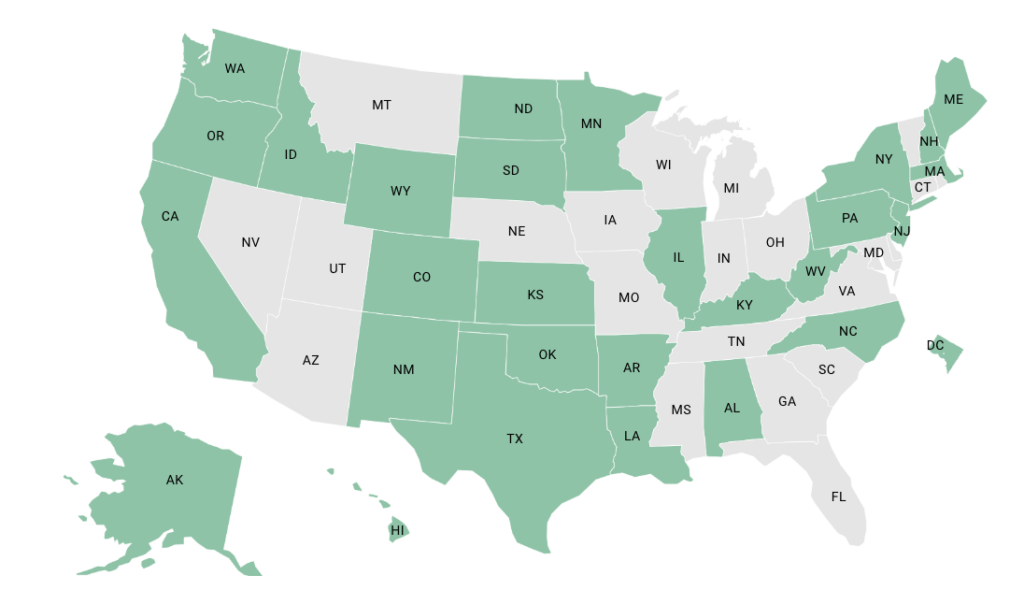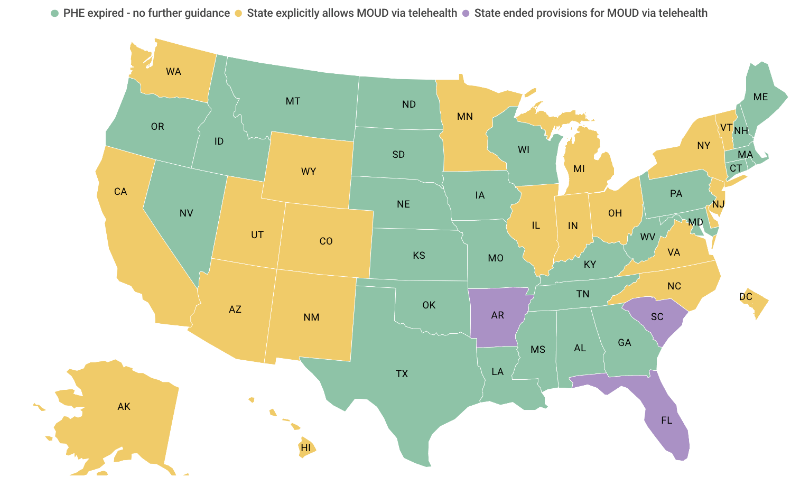This information was collected through a combination of state surveys and NASHP staff research. It offers a snapshot of how the state is defining, training, certifying, and paying for the CHW workforce — as well as how the state is developing cross-agency and state-to-local strategies to improve community health in partnership with CHWs.
This is a dynamic policy space, and states are continuing to develop new approaches. We will continue to make periodic updates to this page. Learn more about state CHW policies across the U.S.
State CHW Definition
Certification and Training
Medicaid Health Plan contracts currently define the required basic core competencies in which CHWs must be trained. Health home models and other care team models that include CHWs require training but do not specify a curriculum or certification.
Medicaid Reimbursement
Medicaid health plans (MHPs) are required to employ CHWs at a ratio of 1:5,000 members. These CHWs may be hired by the MHP or contracted out to a community-based organization or clinical setting. MHPs are provided an incentive through the application of a ratio multiplier for meeting the contractual ratio requirement by contracting with a community-based organization or a clinic for CHW services.
Michigan Medicaid supports several team-based care models that include CHWs, including the health home model, targeted case management for recently incarcerated individuals, and behavioral health peer support services. The health home model is reimbursed through a service bundle code that is billed monthly. The billing/coding model is not specific to CHW services; CHW and peer support services may be delivered as a part of these and other care team models.
Michigan submitted a Medicaid State Plan Amendment to the Centers for Medicaid and Medicare Services (CMS) and it was approved in October 2023.
Other Funding or Financing Mechanisms
The MiCOACH program through the Michigan Department of Labor and Economic Opportunity seeks to coach and mentor graduating high school students from the 10 most under-resourced high schools in the state to enter CHW behavioral health career pathway. Additionally, an initiative through the Michigan Center for Rural Health works to integrate CHWs into rural communities.
Key Partnerships
The MDHHS Social Determinants of Health (SDOH) Strategy identified CHWs as one of four strategic interventions to advance health equity and improve health outcomes in the state. Through the SDOH Strategy, infrastructure has been established to bring together partners and includes the establishment of a CHW subcommittee (which brings together CHWs, state government, community-based organizations, payers, and others to develop policy recommendations); the CHW Internal Alignment Work Group (which brings together state agencies and a CHW Community Feedback Forum) provides ongoing, accessible opportunities for community engagement to ensure the work is informed and driven by communities.
The Michigan Community Health Worker Alliance (MiCHWA) is an information hub that promotes and sustains the integration of CHWs into health and human services organizations throughout Michigan. MiCHWA actively supports CHW education, training, and workforce sustainability by providing a Michigan-specific core competency-based training relevant to CHW skills and roles and administering a statewide CHW registry.
State CHW Legislation
Michigan’s fiscal year 2023 omnibus budget bill included the following boilerplate language: “By September 30 of the current fiscal year, the department shall seek federal authority to formally enroll and recognize community health workers as providers and to utilize Medicaid matching funds for community health worker services, including the potential of leveraging of a Medicaid state plan amendment, waiver authorities, or other means to secure financing for community health worker services.”
State Resources
- Recent stakeholder engagement sessions have been recorded and published on the Michigan Medicaid Providers Training webpage.
- MDHHS SDOH Strategy Community Health Worker
- Michigan Community Health Worker Alliance (MiCHWA)
State Overviews
ACO – Accountable care organization
AHEC – Area Health Education Centers
APHA – American Public Health Association
APM – Alternative payment model
CBO – Community-based organization
CDC – Centers for Disease Control and Prevention
CDC CCR Funding – Community Health Workers for COVID Response and Resilient Communities Funding
CHR – Community health representative
CHW – Community health worker
CPT Codes – Current Procedural Terminology Codes
C3 Project – CHW Core Competency Project
FFS – Fee for services
HCSPCS Codes – Healthcare Common Procedure Coding System Codes
HRSA – Health Resources & Services Administration
MCO – Managed care organization
NACHW – National Association of Community Health Workers
SDOH – Social determinants of health
VBP – Value-based payment
State CHW Definition: This category indicates where states have a formal definition of a CHW. In some cases, where there is not a definition in statute, this category may draw information from provider manuals and state websites or reports.
Certification and Training: This category includes information about how CHWs are trained in the state, which entities provide training, whether or not the state runs or recognizes a CHW certification program, and information about the entities that administer existing certification programs.
Medicaid Reimbursement: This category includes information about state Medicaid strategies that provide enrollees access to CHW services. Entries indicate whether state Medicaid programs currently reimburse for CHW services or incorporate CHWs into alternative payment models under the authority of a state plan amendment (SPA), or where states have earmarked funds to support CHW services under the authority of an 1115 demonstration waiver. It also indicates where CHW services might be supported through managed care approaches (e.g., where MCOs are paying for CHW services using administrative dollars or where states are using managed care contracts to incentivize or require MCOs to cover CHW services).
Other Funding or Financing Mechanisms: This category includes information about other state funding or financing approaches that cover CHW services or CHW positions. It includes information about federal grant dollars for which the state is the grantee.
Key Partnerships: This category offers information about key partners outside state government, including state CHW associations and CHW training entities, and highlights formal cross-agency partnerships within the state that support alignment of funding and resources for the CHW workforce.
State CHW Legislation: This category highlights any state legislation relevant to the CHW workforce. This might include statutory language directing agencies to develop a Medicaid reimbursement approach, laws that established state CHW certification, or other relevant statutes.
State Resources: This category offers links to any key reports or resources that states elected to highlight as critical to CHW policy and partnership.



